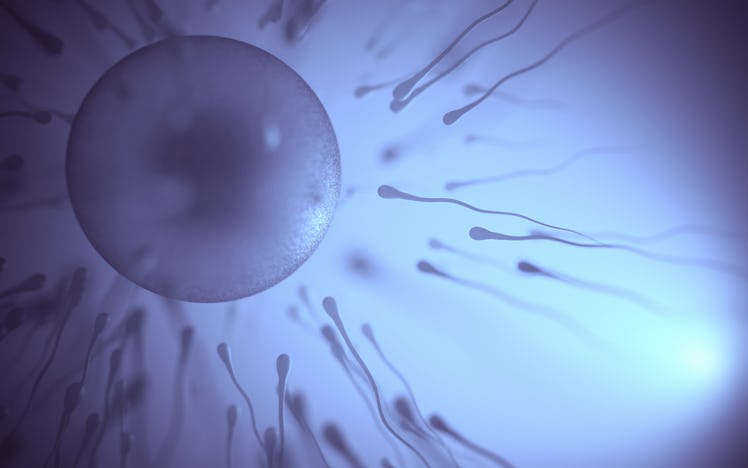Your Chances Of Making A Baby Are Lower If You Have “Old” Sperm, Study Shows
Your lifestyle choices could make your sperm “older” than you are.

Measuring how “old” a person’s sperm is could help predict the chances of them getting pregnant, according to a new study. But sperm’s age isn’t just how many birthdays it’s had. It takes about 64 days for a sperm cell to mature, and depending on how much sex you’re having (or how much you’re masturbating), it’s released into the world shortly thereafter. But a sperm’s age has nothing to do with that cycle. Instead, it has to do with the aging process that occurs at the cellular level. And that biological age is linked to how long it takes a couple to conceive.
Chronological age, or how much time a person has lived, is an important factor when it comes to pregnancy — especially for pregnant people, who have a finite number of egg cells. But it doesn’t tell the whole story.
“All your friends from high school, they're the same age, right?” says J. Richard Pilsner, Ph.D., director of Molecular Genetics and Infertility at Wayne State University in Detroit, Michigan, and lead author of the study. But that number doesn't capture some of the genetic differences they have or environmental factors like smoking or exercising, which can have major impacts on the aging process, Pilsner says.
“Chronological age is actually somewhat of an arcane way of thinking about aging. If we have a precise measurement of the biological age, that's going to give us more information,” he says.
That’s why his team developed a novel technique to read the true biological age of sperm cells. They measured this age by reading how much DNA methylation a sperm cell has — how many of a type of chemical called methyl groups are attached to the sperm’s DNA, which alters how its genes are expressed. The more methylation, the older the sperm. Using this method, the researchers can tell whether sperm’s biological age is up to nine years younger — or older — than its maker’s chronological age.
Pilsner and his team used this technique to analyze the sperm of 379 people from 16 different locations across the U.S. from 2005 to 2009, then followed the participant couples for up to 12 months or until they got pregnant. They compared the sperm’s biological age against the ability of the couple to get pregnant. Couples with older sperm took 17% longer to get pregnant than people with younger sperm.
17%
How much longer it took people with older sperm to get their partners pregnant compared to people with younger sperm.
A sperm’s biological age can match up with a person’s chronological age, but it doesn’t necessarily have to. “A man could be 30 years old, but his sperm's epigenetic age may be 35, and that's causing a lower pregnancy probability,” Pilsner says.
Lifestyle choices can advance the biological aging of sperm. For example, the study found that men who smoked had older sperm.
Pilsner will be conducting more research on what can speed up or slow down sperm aging in the coming months, but he notes that the basics of a healthy lifestyle, sleep, diet, and exercise are important for ensuring that your cells don’t mature too quickly. Future research could also shed light on whether sperm’s age affects the baby’s health.
Knowing sperm’s true age could also help couples get pregnant faster. If a person has very old sperm, for example, they may decide to look into assisted reproductive technology sooner.
“There's very little screening for male reproductive health,” Pilsner says. He hopes that the new technique for determining sperm’s age could one day help doctors diagnose clinical infertility, given that the semen parameters currently used have been shown to be poor predictors of reproductive success. “We need this new biomarker that really captures what's happening biologically within the cell,” he says.
The next step? After validating these findings, Pilsner’s lab will run experiments on mice to see whether there could be pharmacological options for rejuvenating older sperm cells. One day, it’s possible that men having trouble getting their partners pregnant could turn back the clock on their sperm to increase their chances of getting pregnant.
This article was originally published on